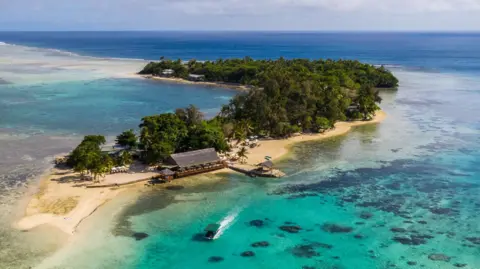In a significant development concerning international relations, Australia and Vanuatu have reached an agreement on a new security and business partnership worth A$500 million (approximately US$328 million or £241 million). This new arrangement, known as the Nakamal agreement, marks a considerable step towards reinforcing ties between the two nations and is poised to transform Australia’s diplomatic and economic relationship with its Pacific neighbor. The deal, which has been months in the making, highlights key commitments by both parties aimed at fostering a more robust regional presence, particularly in the face of China’s growing influence in the Pacific region.
Australia’s Deputy Prime Minister, Richard Marles, underscored the importance of this agreement by describing the connection between Australia and Vanuatu as akin to family: “Our future is very much bound together.” This perspective resonates with Vanuatu’s Prime Minister, Jotham Napat, who emphasized that the agreement is a “win-win situation” crafted to benefit both nations economically and in terms of security. The formal signing of the deal is scheduled for September, bringing to fruition a collaborative vision that stems from a deep-rooted history of interaction between the two countries.
While the Australian government has remained reticent about divulging extensive details regarding the deal, various reports, including those from the Australian Broadcasting Corporation (ABC), suggest significant investments that include the development of two major data centers—one in the capital, Port Vila, and another on Vanuatu’s largest island, Santo. Significant funds will also be allocated to combat climate change challenges, which are particularly pressing for Vanuatu given its status as a low-lying island nation vulnerable to environmental impacts.
One of the discussions during negotiations was the potential for visa-free travel for Vanuatu nationals, a topic deemed vital for the partnership. However, Prime Minister Napat revealed that this element would be addressed within a separate agreement yet to be finalized. The clarity of mutual obligations between Australia and Vanuatu, particularly what Vanuatu’s specific commitments will entail, remains a point of uncertainty. Notably, a previous agreement in 2022 was derailed when the then-prime minister expressed security concerns at the last moment, demonstrating the delicate nature of such international arrangements.
In a symbolic gesture highlighting the shared aspirations of both nations, Marles made these comments at a press conference held on Tanna Island, one of the many islands in the Vanuatu archipelago. He reinforced the idea that the deal represents more than just immediate benefits; it acknowledges a shared security environment and a commitment to collaborative progress. Australia’s Foreign Minister, Penny Wong, echoed this sentiment, articulating that the focus of the agreement is not just immediate impacts but rather the future landscape of bilateral relations: “The most important thing [about the deal] is where we will be [in] three and five and ten years.”
With Prime Minister Napat asserting that the agreement stands to deliver “a lot of great benefits” for both countries—including enhancements in economic transformation and labor mobility—this partnership aligns with Australia’s recent endeavors to bolster its regional relationships. Notably, Australia has established similar agreements with other Pacific nations, including a recent A$190 million security deal with the Solomon Islands and partnerships with Tuvalu and Papua New Guinea.
In conclusion, the Nakamal agreement represents a pivotal moment in Australia-Vanuatu relations, set against a backdrop of shifting geopolitical dynamics in the Pacific. The extensive scope of this agreement encapsulates ambitions not only for immediate economic and security improvements but also for long-term collaborative strategies aimed at confronting shared challenges and enhancing regional stability in an era marked by fluctuating global alliances. As both nations gear up for the signing of this landmark deal, the anticipation of its implications resonates beyond their borders, echoing throughout the Pacific and beyond — emphasizing not only strategic partnerships but also the significance of regional unity in the face of broader geopolitical shifts.











